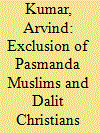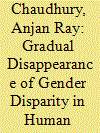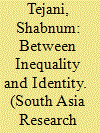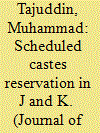| Srl | Item |
| 1 |
ID:
118868


|
|
|
| 2 |
ID:
190671


|
|
|
|
|
| Summary/Abstract |
Based on a re-reading of the Indian Constituent Assembly Debates in light of subsequent developments, this article provides new insights about the extent to which the Indian constitution allows affirmative action for redressing historical disadvantages and empowering marginalised communities. Since the post-colonial Indian state introduced the criterion of religion in the lists of Scheduled Castes (SCs), this sparked suspicions of efforts to prevent conversions, further augmenting India’s Hindu majority. The article re-examines such claims in light of the Indian Constituent Assembly Debates and subsequent Government Orders for notifying/modifying SCs. It argues that the list of SCs was never envisioned as religion-neutral, so that the exclusion of Pasmanda Muslims and Dalit Christians from the SCs is not a communal afterthought, while religion has all along not been the only or main criterion for affirmative action policies.
|
|
|
|
|
|
|
|
|
|
|
|
|
|
|
|
| 3 |
ID:
175111


|
|
|
|
|
| Summary/Abstract |
This study examines the existence and persistence of gender disparity in education in rural and urban India. We use the sequential logit model of regression on data sets provided by three rounds of quinquennial employment and unemployment surveys conducted by the National Sample Survey Office (NSSO). The findings of the study reveal that in both rural and urban sectors of India there is gender group disparity, and this disparity is greater in the rural sector than in the urban areas. Furthermore, it is also found that the gender groups’ disparity in education in India has substantially changed during the last two decades across both sectors.
|
|
|
|
|
|
|
|
|
|
|
|
|
|
|
|
| 4 |
ID:
124973


|
|
|
|
|
| Publication |
2013.
|
| Summary/Abstract |
Recent attention to the history of constitution-making in India reflects ongoing concerns about the difficulties and limitations of India's secular, democratic experiment. Scholars assessing India's secularism have pointed to the failure to separate the state from its involvement in religion from the outset. Through a study of the Constituent Assembly debates, this article suggests that the emphasis on 'religion' as the problem for secularism has been a distraction, taking the gaze away from the substantive arguments minorities were making about how their equal citizenship should be guaranteed. It remained unclear what recognition of 'minority' status was meant to achieve in postcolonial India and what it signified. In failing to recognise the claims of religious minorities for their equality, the Constituent Assembly reified their position as permanently unequal communities in the newly independent state.
|
|
|
|
|
|
|
|
|
|
|
|
|
|
|
|
| 5 |
ID:
113204


|
|
|
|
|
| Publication |
2012.
|
| Summary/Abstract |
India has had political quotas for Scheduled Castes (SCs) since 1950. Using the 2004 National Election Study, this paper finds that neither SCs nor non-SCs feel that their vote is more/less efficacious living in SC constituencies. Yet, some evidence is found in this study that SCs are approached for their vote more often in SC constituencies. Overall, this suggests that quotas are neither associated with a strong positive reaction among SC voters nor a strong negative reaction among non-SC voters.
|
|
|
|
|
|
|
|
|
|
|
|
|
|
|
|
| 6 |
ID:
127876


|
|
|